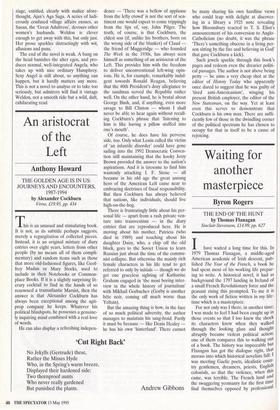An aristocrat of the Left
Anthony Howard
THE GOLDEN AGE IS IN US: JOURNEYS AND ENCOUNTERS, 1987-1994 by Alexander Cockburn Verso, £19.95, pp. 434 This is an unusual and stimulating book. It is not, as its subtitle perhaps suggests, merely a regurgitation of collected pieces. Instead, it is an original mixture of diary entries over eight years, letters from other people (by no means all of them compli- mentary) and random items such as those that more old-fashioned figures, like Geof- frey Madan or Mary Stocks, used to include in their Notebooks or Common- place Books. If it is a slightly surprising lit- erary cocktail to find in the hands of so renowned a transatlantic Marxist, then the answer is that Alexander Cockburn has always been exceptional among the agit- prop company he keeps. Whatever his political blindspots, he possesses a genuine- ly inquiring mind combined with a real love of words.
He can also display a refreshing indepen- dence — 'There was a bellow of applause from the lefty crowd' is not the sort of sen- timent one would expect to come trippingly from the lips of, say, John Pilger. The truth, of course, is that Cockburn, the eldest son (if, unlike his brothers, born on the wrong side of the blanket) of Claud the friend of Muggeridge — who founded The Week in the 1930s, has always seen himself as something of an aristocrat of the Left. This provides him with the freedom to deliver unconventional left-wing opin- ions. He is, for example, remarkably indul- gent towards Ronald Reagan, believing that the 40th President's dozy allegiance to the sandman served the Republic rather well. On the other hand, he is brutal about George Bush, and, if anything, even more savage to Bill Clinton — whom I shall never be able to hear again without recall- ing Cockburn's phrase that 'listening to him is like having a pillow stuffed into one's mouth'.
Of course, he does have his perverse side, too. Only what Lenin called the victim of 'an infantile disorder' could have gone sailing into the 1992 Democratic Conven- tion still maintaining that the kooky Jerry Brown provided the answer to the nation's aspirations. And it is tiresome to find him wantonly attacking I. F. Stone — all because in his old age the great unsung hero of the American Left came near to embracing doctrines of fiscal responsibility. But then Cockburn has always believed that nations, like individuals, should live high-on-the-hog.
There is frustratingly little about his per- sonal life — apart from a rash private ven- ture into transvestism — in the diary entries that are reproduced here. He is moving about his mother, Patricia (who died in 1989) and touching about his daughter Daisy, who, a chip off the old block, goes to the Soviet Union to learn Russian just about the time of the commu- nist collapse. But otherwise the mainly rich female characters in his life tend to get referred to only by initials — though we do get one graceless sighting of Katharine Graham engaged in 'the most boring inter- view in the whole history of journalism' with Mikhail Gorbachev (Gorby is another bete noir, coming off much worse than Yeltsin).
But the amazing thing is how, in the face of so much political adversity, the author manages to maintain his sang-froid. Partly it must be because — like Denis Healey he has his own 'hinterland'. There cannot
`Cut Right Back'
No Jekylls (Gertrude) these, Rather the Misses Hyde Who, in the Spring's warm breeze, Displayed their hardened side: Two thornproof aunts Who never really gardened But punished the plants.
Andrew Gibbons
be many sharing his own hardline views who could leap with delight at discover- ing in a library a 1925 note revealing how Bloomsbury reacted to T. S. Eliot's announcement of his conversion to Anglo- Catholicism (no doubt, it was the phrase `There's something obscene in a living per- son sitting by the fire and believing in God' that gave Cockburn a kick).
Such jewels sparkle through this book's pages and redeem even the drearier politi- cal passages. The author is not above being petty — he aims a very cheap shot at the editor of History Today who apparently once dared to suggest that he was guilty of `tired anti-Americanism', winging his present British employer, the editor of the New Statesman, on the way. Yet at least even this serves to demonstrate that Cockburn is his own man. There are suffi- ciently few of those in the dwindling corner of the political spectrum he has chosen to occupy for that in itself to be a cause of rejoicing.


































































 Previous page
Previous page